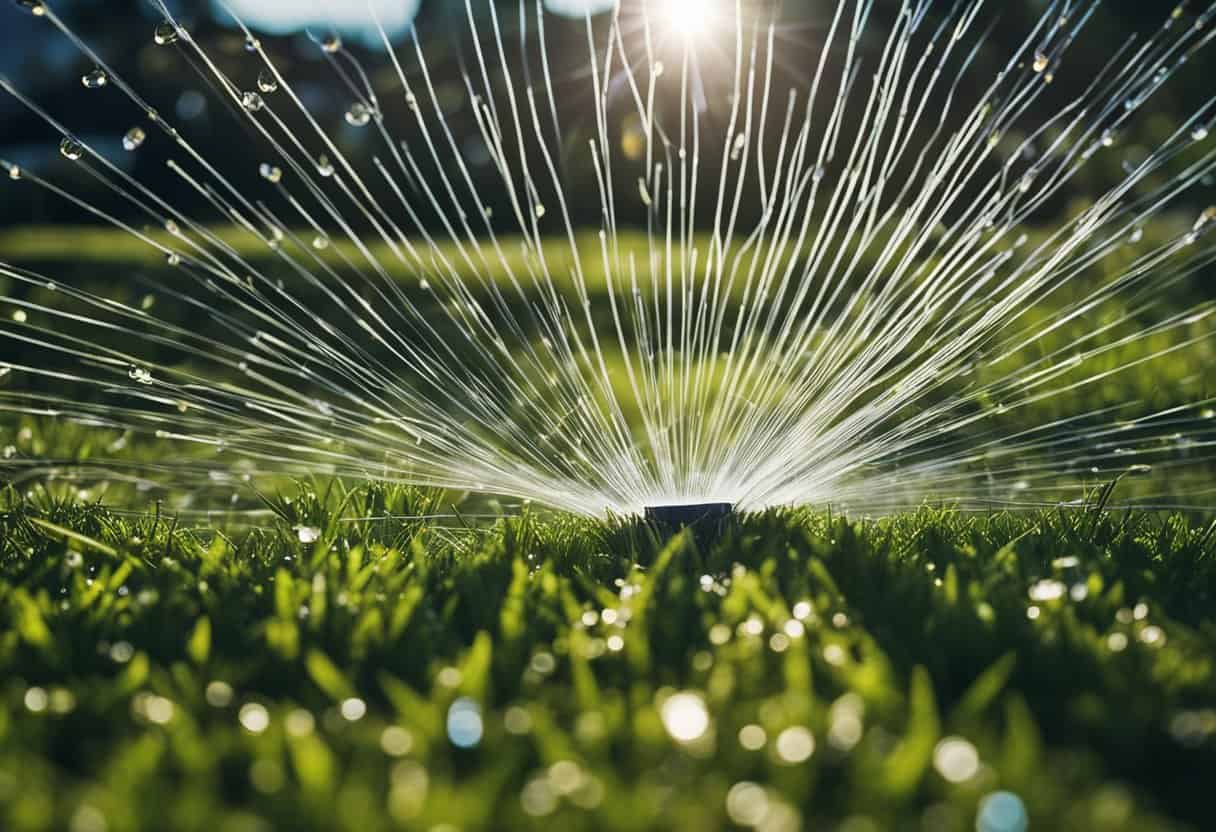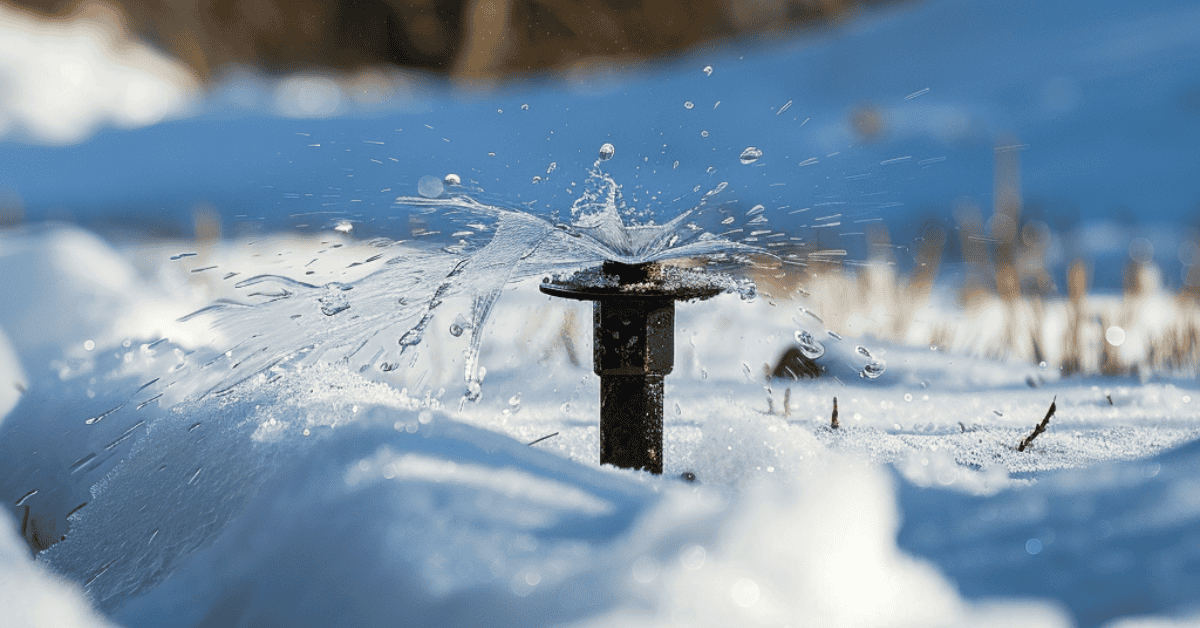Benefits of Automated Inground Sprinkler Systems in Denver Metro
Efficient Water Usage
Automated inground sprinkler systems contribute to water-efficient irrigation by only using the necessary amount of water for each area of your yard. This helps in reducing water waste and allows for optimal plant growth.
No More Manually Moving Sprinklers Around Your Yard
With an automated system, there’s no need to move sprinklers manually. Anything is better than trying to move a sprinkler from place to place and avoid getting soaked as you run away. Inground sprinklers save you time and effort, leading to a more enjoyable gardening experience.
No Messes And Unruly Hoses In Your Yard
Messy hoses and wet surfaces become a thing of the past. Sprinkler systems keep your yard tidy and prevent hazards caused by tangled hoses or slippery surfaces.
Targeted, Precise Water Usage
Automated sprinklers allow for efficient lawn watering by delivering the right amount of water to specific areas. This precise water usage ensures healthy plant growth and reduces water waste.
Advantages of Different Spray Patterns
Inground systems offer various spray patterns to suit diverse plant needs. These patterns help in providing each plant with just the right amount of water, further improving the efficiency and quality of your irrigation system.
Overview of Just Some of the Advantages of Having an Inground Sprinkler System
Types of Inground Sprinkler Heads
Quick Overview of the Different Types of Sprinkler Heads
Fixed Spray Sprinkler Heads
Fixed spray sprinkler heads produce a constant spray of water, covering a specific area. They are ideal for smaller lawns, flower beds, and planters. The spray pattern can be adjusted to fit various shapes and sizes of landscaping areas. This type of sprinkler head is reliable and offers good water coverage for your irrigation system.
Flood Sprinkler Heads
Flood sprinkler heads work differently from other types. Instead of spraying water, they flood the surface area. These sprinklers are best for tree wells, planters, and shrubs that require targeted, deep soaking to reach root zones. Flood heads disperse water in small areas of 5 feet wide or less, ensuring the soil receives adequate moisture.
Pop Up Sprinklers
Pop up sprinklers stay hidden underground when not in use, only rising when the irrigation system is turned on. This design keeps the sprinkler heads protected from damage, and maintains the aesthetic look of your lawn. Pop up sprinklers come in various heights to meet the needs of different types of plants and landscapes.
Rotary Sprinkler Heads
Rotary sprinkler heads produce a rotating stream of water, which makes them suitable for larger areas and slopes. The rotating motion allows for a lower application rate, helping to prevent runoff and water pooling. Rotary heads are a popular choice for lawns with irregular shapes and varying levels of elevation.
Irrigation Controller Dashboards
Highly Programmable
Irrigation controller dashboards offer a high level of programmability. Users can customize water schedules, monitor water usage, and even adjust irrigation settings remotely. This leads to efficient water use and a healthier landscape.
Rain Sensor Features
Rain sensor features in irrigation systems help save water. They sense rainfall and automatically adjust the system to reduce or stop watering when it’s raining. This prevents overwatering and ensures optimal water use for your Denver lawn. This will keep you compliant with Denver Water’s strict watering guidelines.
Separate Timer Settings For Each Zone
Irrigation controller dashboards allow users to set separate timer settings for each zone in their system. This means you can customize watering times and durations for different areas of your landscape, catering to the unique needs of each plant or lawn type.
WiFi and App Control
WiFi and app control features bring convenience to irrigation services. Users can access their irrigation controller dashboard from a smartphone or tablet, making it easy to control and monitor their system from anywhere. This ensures proper water management and a well-maintained landscape in Denver.
Sprinkler System Installation Process
Designing Separate Watering Zones for Your Lawn
An important step in sprinkler system installation is the design phase. Denver sprinkler specialists take into account your lawn’s unique characteristics to create separate watering zones. This ensures that different areas of your landscape receive the appropriate amount of water based on their specific needs. By optimizing water usage, you can also conserve water and reduce your utility bills.
Digging Trenches To Optimal Depth
Once the design is complete, your sprinkler installation team will begin digging trenches throughout your lawn. These trenches will safely house the pipelines. They are dug to an optimal depth, preventing damage from foot traffic, lawn equipment, or freezing temperatures during Denver’s cold winters.
Insert Pipes In Trenches
After the trenches reach the desired depth, irrigation specialists lay the pipelines along them. These pipes will serve as the backbone of your inground sprinkler system, distributing water to the various sprinkler heads across your lawn efficiently and uniformly.
Connect To A Water Source and Install The Zone Valves
To ensure proper water flow, the installation process also involves connecting the pipelines to a water source. This water source could be a main line or an external tap. Additionally, the team will install zone valves to regulate the water pressure and flow to each watering zone.
Connect Pipes To The Valve Box
The next step in the installation process includes connecting the main pipeline to a valve box. The valve box serves as a central control point for the entire sprinkler system, enabling maintenance access and protection from the elements.
Connect Sprinkler Heads And Drip Irrigation To Pipes And Establish Wiring
Once the pipes are securely in place, your installation team will attach sprinkler heads and any necessary drip irrigation components to the pipelines. They will also establish the wiring for the system, ensuring proper communication between the valves, sprinkler heads, and the controller.
Connect Your System to Controller
Lastly, your sprinkler system in Denver will be connected to a central controller. This allows for easy adjustment and scheduling of your watering cycles, ensuring that your lawn remains healthy and vibrant while minimizing water waste.
Sprinkler System Maintenance and Repairs
A well-maintained inground sprinkler system can contribute to a healthier turf in Denver, Colorado. Regular maintenance and repairs ensure the system’s efficiency and longevity. This section covers two essential aspects of sprinkler system maintenance: replacing damaged sprinkler heads and winterizing the system.
Replacing Damaged Sprinkler Heads
Damaged sprinkler heads can cause inefficient water distribution and negatively impact lawn health. Regularly inspect the sprinkler heads for wear, cracks, or clogs. Replace any faulty heads promptly to keep the system functioning optimally.
To replace a damaged sprinkler head, follow these steps:
- Turn off the water supply to the system.
- Dig around the damaged head, exposing the riser connection.
- Unscrew the faulty sprinkler head from the riser.
- Screw in the new sprinkler head and adjust its height.
- Fill the hole with soil and turn on the water to test the new head.
Homeowners can perform the replacement process themselves, or they can hire a professional to handle the task.
Winterization Of Your Inground Sprinkler System
Denver experiences harsh winters, making it crucial to winterize your inground sprinkler system to prevent freezing and potential damage. The winterization process involves removing water from the pipes, valves, and sprinkler heads.
Here are the steps to winterize your sprinkler system:
- Shut off the main water supply to the system.
- Open the drain valves and manually drain the water from the pipes.
- Activate the controller to run each zone sequentially, allowing any remaining water to escape.
- Insulate the backflow preventer, valves, and exposed pipes to protect them from freezing temperatures.
Although these steps can be carried out by homeowners, it is highly recommended to hire a professional for thorough and safe winterization.
Frequently Asked Questions

How Much Does It Cost to Install a Sprinkler System in Denver, Colorado?
The cost of installing a sprinkler system in Denver can vary based on factors such as the size of your property, the complexity of the system, and the materials used. This article provides a detailed breakdown of the factors that contribute to the cost of a lawn sprinkler system and notes that the prices for installation start at around $1,500 for a relatively small property with few zones, and it goes up from there.
How Long Does It Take to Install an Inground Sprinkler System?
The time it takes to install an inground sprinkler system depends on the size and layout of your property. For most residential properties, the process may take a couple of days to a week. However, large commercial properties may require more time. The installation process typically includes mapping out the system layout, digging trenches for pipes, and installing the sprinkler heads, valves, and piping.
How Deep Should Sprinkler Pipes be Buried?
The optimal depth for burying sprinkler pipes is 8 to 12 inches below the ground. This depth helps prevent damage from foot traffic, lawn equipment, and weather-related factors such as freezing and thawing. It is essential to consider factors such as local climate and soil type when determining the appropriate depth for sprinkler pipes in your area.
Are There Outdoor Watering Restrictions In Denver I Should Be Aware Of?
Yes, Denver often enforces outdoor watering restrictions, especially during times of water scarcity. The Water Wise Rules provide guidelines for responsible water usage, which may limit the days and hours you can use your inground sprinkler system. It is essential to familiarize yourself with these restrictions to ensure compliance and minimize the impact on local water resources.
Sprinkler Systems
Give Your Lawn and Planting Areas the Exact Amount of Moisture They Need

DIY Yard Care
Check out our blog for information on how to do upkeep around your yard. Tips and tricks for keeping your lawn, plants and trees healthy.

Denver Events Calendar
A monthly listing of the events for you and your family to enjoy in and around Denver

Sprinkler System Blog Posts
Below are blog posts from our blog related to tree planting and overall tree health.
When You Should Start Watering in Denver This Spring
COMPLETE LIST OF ALL SERVICES
All Services
Click a Link Below for More Information About Services Provided
Hardscaping
Curbing
Decks
Fence Maintenance & Install
Fire Pits
Landscape Lighting
Outdoor Kitchens
Patios
Pergolas & Gazebos
Retaining Walls
Walkways
Sprinkler Systems
General
Fall Cleanup-Leaf Removal
Landscape Design
Mulching
Organic Landscaping
Snow Removal
Spring Cleanup
Water Features
Xeriscaping
Trees, Shrubs & Perennials
Flower Beds & Planters
Hedge & Shrub Trimming
Stump Grinding
Tree Planting
Tree Removal
Tree Trimming & Pruning
Lawn Maintenance
Lawn Aeration
Lawn Dethatching
Lawn Edging
Lawn Fertilization
Lawn Mowing
Pest Control
Weed Control
Drainage Issues
Sod & Turf
OUR SERVICE AREA
Serving Denver and Surrounding Suburbs
The perfect Denver landscaper for your needs.
For more information, click on your community below
LET’S GET STARTED
Contact Us
Denver Landscaping Lynx
Phone:
303.268.2866
Email:
operations@denverlandscapinglynx.com
Hours:
Sun – Sat: 8am – 6pm


